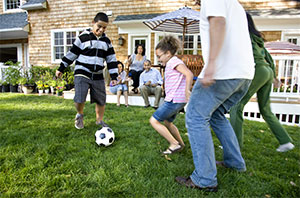School's out for summer, and that means that many parents in North Carolina are opening their backyards to their children's friends and neighborhood buddies. It's a parent's prerogative to keep all children safe, even those who are not their own; but did you know that you could be held liable if a child gets injured on your property? Here are some steps you can take to maintain a kid-friendly outdoor environment, so that summer at your house comes with the minimum amount of risk.
 Design with safety in mind: Aesthetic and maintenance concerns are usually at the top of the list when it comes to landscaping, installing a pool or designing an outdoor space. If you plan to have children at your home, add safety to the mix. Creating a backyard with kids in mind is much easier than dealing with safety hazards that could have been avoided in the first place.
Design with safety in mind: Aesthetic and maintenance concerns are usually at the top of the list when it comes to landscaping, installing a pool or designing an outdoor space. If you plan to have children at your home, add safety to the mix. Creating a backyard with kids in mind is much easier than dealing with safety hazards that could have been avoided in the first place.
Buy quality equipment: Purchase play equipment that's sturdy and up to code, and make sure it's appropriate to the age level of the kids you plan to host. Don't attach ropes or other items to existing equipment to avoid creating additional safety or strangulation hazards.
Provide a soft landing: If you have any kind of playground equipment, tending to the ground underneath will save both you and your kids a headache when the inevitable accident occurs. Use rubber or sand underneath swing sets or jungle gyms to protect children from experiencing major consequences from a fall.
Don't get tripped up: Walk your backyard and check for tree stumps, rocks, sharp or protruding objects, stray toys or other things kids might trip or hurt themselves on. Keep your lawn mowed and well maintained, and free of trash or pet waste.
Keep them out: Securely lock or block off areas in or around your backyard that kids shouldn't be playing in. This includes sheds, garage workshops, grilling areas and swimming pools when not in use.
Rein them in: If your backyard isn't fenced, consider purchasing some type of barrier, especially if you are hosting younger children.
Create some traction: Are there areas around your home that tend to get slippery when wet? Apply a non-skid coating or use rubber mats to make it less likely that someone will take a fall.
Beware of poisonous chemicals and plants: Certain plants can cause an allergic reaction or worse if ingested or if they come into contact with skin. Similarly, common lawn maintenance chemicals and deck sealants can be harmful to humans. Know what plants and chemicals are in your backyard and teach kids to avoid them but also be sure to have a plan in case they don't.
Know your charges: It's important to be aware of any special medical issues or allergies when hosting children who are not your own. Learn what to do if a child experiences an adverse medical event; if you don't feel comfortable with the risk, only allow the child at your home accompanied by a parent or guardian.
Supervise, supervise, supervise: A carefully kid-proofed backyard is still no substitute for adult supervision. If you're not able to really keep an eye on your children and their guests, save the play date for another afternoon.
For any insurance questions, call or contact Litaker Insurance today.
